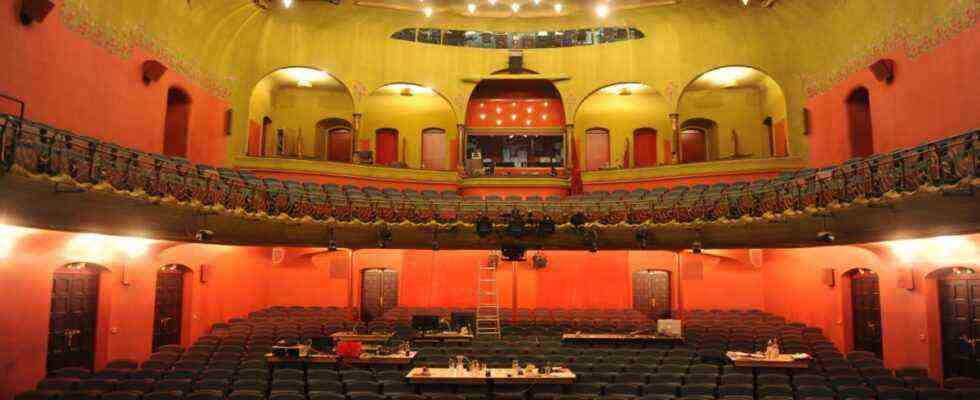Anton Biebl appeared in front of the camera twice on Thursday. In both speeches, Munich’s cultural advisor used the term “game changer”. Once at the presentation of the anniversary program for the 50th anniversary of the Olympic Games, which his department oversees, then at the presentation of the cultural budget for 2022 in the amount of 239.4 million euros. So Biebl longs for a change in the Corona marathon: “I hope that 2022 will be a game changer year, as was the case in 1972 at the Olympic Games in Munich.” He would like “a similar departure”.
The fact that this hope is more of a fear is shown by the acute problem areas that Biebl named in front of the virtually assembled culture committee: On the one hand, there is the “social constitution”, i.e. the danger to democracy that reminded him of the time before the advent of the Nazis remembered and which a culture of togetherness, education and sustainability must counteract. On the other hand, the pandemic continues to strike. In order to finally contain them, the world of events is once again being almost paralyzed by restrictions (“We are as far as we were at this time last year.”). And because of the Corona holes in the city coffers, the Munich treasurer, like in the other departments, is also demanding “drastic” (Biebl) savings of 12.8 million euros and additional income of 1.8 million from culture. Munich’s cultural institutions should earn more but spend less. “The culture officer would have to have magical powers and clairvoyant abilities to develop reliable plans and a solid cultural budget under these circumstances,” said Biebl, who is approaching this challenge “with a good dose of confidence and the will to make things possible”.
His confidence is also based on the experience of how the crisis year 2021 was mastered. The opening of the Schwere Reiter, the new Volkstheater, the district centers Luise and Trafo II and the Gasteig-Interim with the Isarphilharmonie and the city library were “rays of hope”. In an emergency, new ideas and programs were also developed and spaces for culture conquered, from the “collective gardens” of the young techno teams to “Bayern plays!” in the English Garden. “Without Corona, some campaigns would have failed due to many concerns. That was great! We should have the courage to consolidate some of these new achievements!” says Biebl.
Two million euros less for the Kammerspiele
The culture industry cannot be managed with courage and commitment alone. It takes money, and there will be less of it in 2022. So Biebl read out a list of “atrocities”, who will have to save how much: the Kammerspiele 2 million euros, the municipal museums 1.1 (City Museum 312,000, Villa Stuck 194,000, Lenbachhaus 404,000, NS-Document Center 121,000, Jewish Museum 58,000, Valentin-Karlstadt-Musäum 13,000), 707,000 euros for the Munich Adult Education Center (which was already heading for bankruptcy in 2021), 453,000 for the City Library, 412,000 for the Philharmonic, 150,000 for the German Theater, 31,000 for the Pasing factory, 15,000 for the Villa Waldberta (the artists’ grants are not affected), 83,000 for the Volkstheater, whose budget was increased by 5.4 to 10 million euros due to the additional need in the new house. Biebl snags 730,000 euros in the department and management. This shows that the large urban cultural institutions are once again making an above-average contribution to the consolidation of the cultural budget. However, these also make up the largest individual items in the budget, around 38 million for the Kammerspiele, 27 million for the Philharmonic, 47 million for the city library, 35 million for the museums and 5 million for the NS documentation center.
As in the previous year, the independent scene would be “largely spared,” emphasized Biebl. What was also achieved, as City Councilor Florian Roth of the Greens noted, that the city canceled the grant of 5.4 million euros to the state theaters (Opera and Gärtnerplatz). But also in the “funding area” there is 1.2 million euros less (around 50,000 euros for the backstage), with which 39 million euros can be distributed here, 19 million of which to the independent scene (artists, district culture, cultural education … .).
A new pricing system for the Kammerspiele has been launched, and the Philharmonic will follow. However, it is almost impossible for the cultural department to generate much more income as required, as the pandemic has caused a drastic lack of visitors. In addition, increased admission prices would jeopardize the goal of making culture easily accessible to all sections of the population.
Cultural Mayor Katrin Habenschaden was “proud of the cultural department”, and city councilors from across the parliamentary groups also praised the commitment. With this “tailwind” from the committee, Biebl and his team can tackle the major tasks in 2022, such as the operating concept for the Jutier and barrel hall, new experimental rooms such as Pixel, KÜR or Kopfbau in Riem, and the Olympic anniversary “with a lot of power”.

